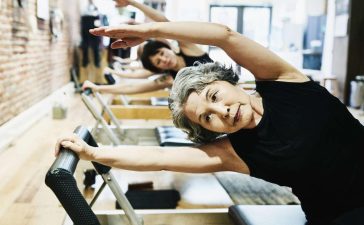‘Gymxiety’ Used to Ruin My Workouts—These 6 Tips Helped Me Overcome It
A few months ago, the mere thought of entering a weight room felt as intimidating as being asked to perform as a backup singer during a packed Taylor Swift concert. Despite having lifted weights for years, I still grapple with what I’ve affectionately coined “gymxiety.” It’s not a clinical term, but it aptly describes the trepidation, unease, and anxiety that can accompany working out in a public gym setting. For those who’ve never ventured into a fitness facility, this experience can be especially daunting.
Why Do We Get Gymxiety?
“I believe it’s a vulnerable experience to enter an unfamiliar environment and use machines that can seem complex at times,” says Linda Ruvalcaba, a licensed professional counselor based in Arizona. She points out that anxiety often arises in new surroundings when we lack full trust in ourselves. “Anxiety thrives on having all the answers and being ultra-prepared,” she notes. “Yet, life involves having faith in our ability to handle whatever comes our way.”
Over time, with plenty of patience and gradual steps, I’ve grown confident enough to work out in almost any setting. If exercising in front of others triggers anxiety for you, rest assured that it’s entirely normal and may require some time to overcome. Below, I’ll share a few strategies that have helped me manage “gymtimidation,” along with tips from others who’ve faced similar challenges and advice from fitness experts.
Strategies to Help Overcome Gymxiety
1. Build a support system.
Ruvalcaba points out that traditional gyms have often felt unwelcoming for various reasons. They’ve had a historical association with individuals who have muscular or slender body types, tend to be crowded, and are equipped with unfamiliar machinery. “I suddenly feel like I’m in the spotlight when I get on a machine,” Ruvalcaba says. “I feel embarrassed if I don’t initially know how to use it.”
Last summer, Ruvalcaba began attending a local gym, and she found that going with family members made the process more manageable. “My sister guided me on how to use the machines and how many reps to do,” she explains. “My mom is really good at correcting my form.”
Don’t have a gym buddy? Consider enlisting a friend to be your virtual cheerleader, suggests Gerren Liles, a fitness trainer based in New York City with Lululemon Studio. “You can inform your support network that you’re heading to the gym and check in for reassurance,” he says. I recently put this to the test by messaging my personal trainer or a friend whenever I felt self-conscious, such as when I asked a stranger to share a machine while they were resting (gulp!), and it genuinely made a difference!
2. Try a group fitness class.
Transitioning from private workouts, like practicing yoga at home, to public exercise in a crowded gym can be quite a leap. If you’re looking to make this transition, consider starting with a group fitness class, as suggested by Gerren Liles. “When you take a class, you’re in an environment where you’re conditioning yourself to be around other people, and you get some coaching,” Liles recommends. “Obviously, the instructor can’t focus on you completely, but you will get a good basic idea of how to do the exercises.”
As you gain confidence over time, you may feel prepared to explore different areas of the gym. On the other hand, you might discover that group classes are your preferred choice. “Once I discovered group classes, my whole life changed,” says Emily Gerard, a resident of New York City who is a dedicated participant in Pilates, strength, and HIIT classes at Equinox. Gerard adds, “Someone has already put in the mental energy to come up with a good way to spend 45 minutes at the gym. If you’re doing something wrong, the instructor will gently show you how not to hurt yourself. And you’re in a group, so you don’t feel like you stick out.”
3. Come prepared.
Going to the gym doesn’t have to be an intimidating experience if you plan ahead. Madeline Danza, a certified strength and conditioning specialist, emphasizes the importance of researching and writing down your exercises before heading to the gym. This preparation will boost your confidence and ensure you don’t feel lost or aimless when you arrive.
Creating a structured gym routine can be challenging, so consider using a fitness app that provides pre-designed workout routines. Apps like the Alpha Progression app or Centr can be helpful for this purpose.
To feel well-prepared for your gym visit, take the time to review your workout plan at home. Visualize where the equipment is located and plan your route. If you have questions about proper form or equipment usage, consult your trainer or watch instructional videos on platforms like YouTube. You can even create a digital “workout album” on your phone, containing photos and videos of exercises for quick reference. Be sure to rely on reputable sources, such as fitness professionals accredited by organizations like NASM, or trusted health publications, to ensure the accuracy and safety of your workout information.
4. Wear clothes that make you feel good.
Finding the perfect workout clothes can sometimes feel like a Goldilocks situation, with leggings that are too tight, fail the squat test, or roll down at the waist. The right workout gear can significantly boost confidence and ensure a distraction-free exercise session. Here are some tried-and-true recommendations for comfortable workout clothing:
- Lululemon Wunder Train Leggings: These leggings are ideal for strength training, offering medium compression and a supportive waistband. They provide excellent support and stay in place during various activities without digging into the skin.
- Vuori Daily Bra: The Vuori Daily Bra is a comfortable sports bra that is easy to put on and take off, unlike some other sports bras with complex designs. With just two wide straps, it eliminates the need to figure out a complicated criss-cross pattern.
- Feetures Socks (Elite Max Cushion No Show): For cardio workouts, these plush socks are a must. They stay securely in place, preventing sneakers from rubbing against the heel, even during long runs.
Being comfortable in your workout clothes, especially during intense or uncomfortable exercises, can make a significant difference in your overall workout experience.
5. Remember that the gym is for everyone—including you.
Feeling insecure and comparing yourself to others at the gym, especially when you perceive others as lifting heavier weights, is a common experience. However, it’s important to remember that the gym is a space for everyone, and every member pays the same membership fee for access to the equipment and facilities. No one has more entitlement than others based on their level of experience or strength.
It’s natural to have concerns about taking up resources in a busy gym, but it’s crucial to recognize that you have every right to use the space and equipment, just like any other member. Overcoming gym anxiety and feelings of insecurity may take time, but reminding yourself of your entitlement and worthiness to be there can help boost confidence.
Ultimately, focusing on your own progress and fitness journey, rather than comparing yourself to others, can lead to a more positive and fulfilling gym experience. Everyone has their own starting point and goals, and the gym is a place for personal growth and improvement.
6. Work with a professional trainer (it is so worth it).
Hiring a fitness professional, such as a personal trainer, can be an excellent investment when you’re working on building confidence in the gym. A trainer can provide guidance on proper form, create tailored workout routines, and offer support and motivation. Working with a fitness professional can significantly enhance your gym experience and help you feel more knowledgeable and confident in your workouts.
Having your form corrected and receiving personalized guidance from a professional can make a substantial difference in your progress and overall confidence. Additionally, a personal trainer can serve as a valuable source of encouragement and motivation, helping you overcome any imposter syndrome or self-doubt you may experience.
Investing in a personal trainer can be a worthwhile step in your fitness journey, allowing you to develop the skills and confidence needed to thrive in the gym.
You Might Also Like
The Benefits of Walking on the Beach
Walking on the beach can be more challenging than walking on pavement, grass, or a treadmill due to the uneven...
5 Types of Exercise That Can Support You During Menopause
Menopause is a natural phase in a woman's life, and its symptoms can vary widely from person to person. Some...
Nature’s Healing Touch: The Multifaceted Benefits of Spending Time Outdoors
Spending time in nature offers numerous benefits for mental, emotional, and physical health. Unfortunately, our modern, fast-paced, and highly connected...
9 Everyday Habits That Help Relieve Back Pain
When it comes to managing, preventing, and relieving back pain, it's essential to consider the everyday habits that can make...











